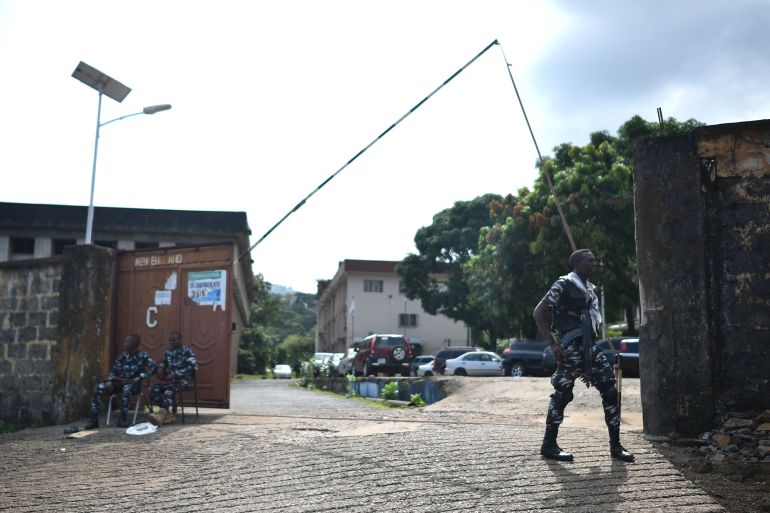Sierra Leone attacks were a failed coup attempt, officials say
Information minister says 13 military officers arrested in relation to the weekend assault in capital Freetown.

A series of attacks on military barracks and prisons in Sierra Leone over the weekend was a failed coup attempt, according to police and government officials in the West African country.
Information Minister Chernor Bah said that 13 military officers and one civilian have been arrested following the incident.
Keep reading
list of 3 itemsTwenty killed in Sierra Leone attack on military barracks, army says
Sierra Leone president says ‘most leaders’ of unrest arrested
“The incident was a failed attempted coup. The intention was to illegally subvert and overthrow a democratically elected government,” Bah said on Tuesday.
“The attempt failed, and plenty of the leaders are either in police custody or on the run. We will try to capture them and bring them to the full force of the laws of Sierra Leone.”
The inspector general of police said the attempted coup “failed in the early hours of the 26th of November”.
William Fayia Sellu told reporters that “a group of people” had tried to illegally “unseat” the government with force.
Police have published photographs of 32 men and two women it said were being sought in connection with the unrest. They include serving and retired soldiers and police, as well as some civilians.
Government authorities have said at least 20 people were killed in the attacks and about 2,200 people also escaped from prisons that were attacked.
In televised remarks on Sunday, the country’s President Julius Maada Bio said that “most of the leaders” of the attack had been arrested, and that the government would continue to pursue the rest.
Those killed include 13 soldiers, three assailants, a police officer, a civilian and someone working in private security, according to authorities. Eight people were also seriously injured.
Tensions remain in Freetown, where checkpoints have sprung up and schools and banks remain closed, while a curfew is in place from dusk until dawn.
Frictions in the West African nation have been building since a contested election in June, with President Bio winning reelection amid concerns about the transparency of the election from European Union observers and United States officials.
Samura Kamara, candidate of the opposition All People’s Congress (APC), rejected the results and said that the election had not been credible.
The country has also struggled with the economic fallout of the COVID-19 pandemic and Russia’s invasion of Ukraine, and police opened fire on a crowd of demonstrators protesting high food prices last August.